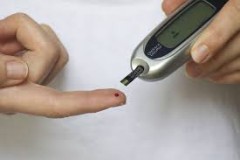Diabetes
What are the signs of diabetes?
Frequently signs of diabetes can be very non-specific. The classic symptoms are increased appetite, excessive thirst, and frequent urination. It can also lead to decreased resistance to infection, especially urinary tract infections and yeast infections, as well as subtle yet progressive change in vision. People with a family history of diabetes or who are overweight are at an increased risk. Diabetic complications can lead to loss of eyesight, kidney function, or even limbs as well as contributing to strokes and heart disease, so if you think you may have diabetes, see your physician.
How do I know if I have diabetes and how can I control it?
Diabetes is an increasingly common disease in which the blood sugar becomes higher than normal. Most diabetics are type 2 where there may be no symptoms at all for many years. When blood sugars become severely elevated, symptoms that appear include large volumes of urine, intense thirst resulting in drinking large quantities of fluids, fatigue, and, sometimes, blurriness around lights at night. Type 2 diabetes can often be controlled initially without medication just by diet, exercise, and weight loss. There are many effective oral medications. All type 1 and many type 2 diabetes will require insulin. Tight control of the blood sugars reduces the risk of complications.
I’m diabetic, how should I be caring for my feet?
Foot problems are one of the great concerns of any patient with diabetes. The higher than normal blood sugar levels with diabetes damages the blood vessels and nerves in your body. This may cause burning pain or numbness in your feet and impair the normal blood flow that allows for normal healing. This can make it difficult for you to know if you have a blister or sore, which can get worse and even require hospitalization and intra-venous antibiotics, and what we all hope to avoid, the possibility of needing an amputation if the blister or sore becomes too sever.
What to do?
First, keep your blood sugar as normal as possible. Keep your feet clean and dry. Check them everyday, with a mirror if needed. Call your doctor at the first sign of redness, swelling, or pain that doesn’t go away, and don’t go barefoot!
